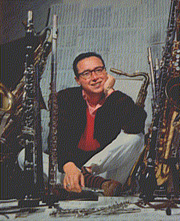Home · Listener's Guide · The Songs · Who's Who · Liner Notes · Selected Tracks · What's New · Search

Pete Rugolo
- Born 25 Dec 1915, Patti, Sicily
 Rugolo's parents emigrated to the US in 1920 and settled
in Santa Rosa, California. He followed his father's example and
started in music playing the baritone, but quickly picked up other
instruments, including the French horn and piano. He took a
bachelor's degree in music at San Francisco State College and then
studied composition with Darius Milhaud at Mills College in Oakland
(as did Dave Brubeck after the war). Veteran jazz trombonist and studio musician Milt Bernhart has said that "Pete is without question Milhaud's prime disciple. To call what Rugolo has written 'jazz' would be somewhat off-base. I would call it 'good' and leave it at that.
Rugolo's parents emigrated to the US in 1920 and settled
in Santa Rosa, California. He followed his father's example and
started in music playing the baritone, but quickly picked up other
instruments, including the French horn and piano. He took a
bachelor's degree in music at San Francisco State College and then
studied composition with Darius Milhaud at Mills College in Oakland
(as did Dave Brubeck after the war). Veteran jazz trombonist and studio musician Milt Bernhart has said that "Pete is without question Milhaud's prime disciple. To call what Rugolo has written 'jazz' would be somewhat off-base. I would call it 'good' and leave it at that.
After graduating, he was hired as an arranger and composer by guitarist and band leader Johnny Richards. Drafted in 1942, he spent most of his time in an Army band at Fort Scott in San Francisco, playing alongside later Brubeck cohort Paul Desmond. He went to work full-time for Kenton after his discharge in 1945, and in the following 4 years, wrote some of Kenton's most famous and innovative arrangements.
In 1949, he was hired by Capitol Records to be its East Coast music director, and had great success as an arranger and A&R man, backing Nat King Cole, Mel Torme, June Christy, Woody Herman, Peggy Lee, and others. He also produced serious jazz recordings by Lennie Tristano and others. He came up with the title for the legendary Miles Davis/Gil Evans/Gerry Mulligan recording, "The Birth of the Cool."
Rugolo left Capitol and moved to Hollywood, where he served as a staff composer and arranger for MGM studios and as musical director for Mercury Records. His main focus became scoring for movies and television, but he briefly attempted to lead a touring band as well. Like Henry Mancini and Elmer Bernstein, he was in constant demand by the studios, but like Mancini, he was also able to negotiate a recording contract--with Mercury in his case--that allowed him to release a series of LPs featuring his own arrangements and compositions. In his own recordings, Rugolo was enjoyed experimenting with odd combinations of instruments, as the titles of his Mercury LPs suggest.
Rugolo's TV work ranks up with the best of his era. Among the series he scored for were "The Thin Man," "Richard Diamond," "The Stranger," "The Fugitive," "Run for Your Life," "Lie Detector," "Felony Squad," and "Family." He won an Emmy for his scoring work on the rotating doctor-lawyer-adventurer series, "The Bold Ones." He also wrote scores for the films "Glory Alley," "The Strip," "Easy to Love," Jack the Ripper," "The Sweet Ride," and "Everything I Have is Yours."
By the early 1960s, studio work consumed all of Rugolo's energies, and he stopped recording except for soundtrack albums. He recently came out of semi-retirement to compose and conduct the score for "This World, Then the Fireworks," and otherwise-unsuccessful adaptation of a Jim Thompson novel.
Recordings
- Adventures in Rhythm, Columbia CL-604
- Introducing Pete Rugolo, Columbia CL-635
- Rugolomania, Columbia CL-689
- New Sounds, Harmony HL-7003
- Reeds in Hi-Fi, Mercury MG-20260
- Brass in Hi-Fi, Mercury MG-20261
- Gigi, Mercury MG-20367
- TV's Top Themes, Mercury MG-20706
- Music for Hi-Fi Bugs, Mercury MG-36082
- Percussion at Work, Mercury MG-36122
- Plays Kenton, Mercury MG-36143
- The Music from "Richard Diamond," Mercury MG 36162
- Out on a Limb, Mercury MG-36225
- Music from Out of Space, Mercury SR 60118
- An Adventure in Sounds--Reeds, Mercury MG 60039
- An Adventure in Sounds--Brass, Mercury MG 60044
- 10 Trombones Like 2 Pianos, Mercury PPS 2001
- 10 Trumpets and 2 Guitars, Mercury PPS 2016
- 10 Saxophones and 2 Basses, Mercury PPS 2023
- Behind Brigitte Bardot, Warner Brothers WBS-8001
-
Soundtracks
- Jack the Ripper, RCA Victor LSP-2199
- Thriller, Time Series 2000 52034
- The Sweet Ride, 20th Century Fox S4198
- This World, Then the Fireworks, Varese Sarabande VSD-5860
-
With the Four Freshmen
- Four Freshmen/Five Trombones, Capitol T683 (arrangements)
- Four Freshmen/Five Saxes, Capitol T844 (arrangements on Side 1)
- Voices in Latin, Capitol T 922
- More 4 Freshmen and 5 Trombones, Capitol T 2168
-
With Patti Page
- In the Land of Hi Fi, Mercury SR 80000
- The East Side, Mercury SR 60114
- The West Side, Mercury MG 36136
-
With Billy Eckstine
- Billy Eckstine's Imagination, Mercury MG 36129
- With Ruth Olay
- Olay!, Mercury SR 60085
-
With June Christy
- Something Cool, Capitol T 516
- The Misty Miss Christy, Capitol T 725
- June, Fair and Warmer!, Capitol T 833
- Gone for the Day, Capitol T 902
- This is June Christy, Capitol T 1006
- The Song is June, Capitol T 1114
- Recalls Those Kenton Days, Capitol T 1202
- Off Beat, Capitol T 1498
- This Time of the Year, Capitol T 1605
S p a c e A g e P o p M u s i c
Home · Listener's Guide · The Songs · Who's Who · Liner Notes · Selected Tracks · What's New · Search
Email: editor@spaceagepop.com